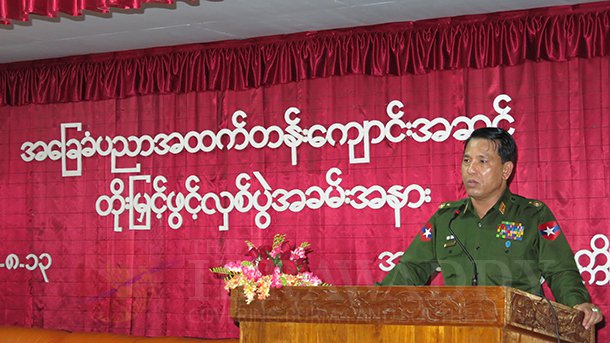RANGOON — The Arakan State parliament announced on Monday that Gen. Maung Maung Ohn has been confirmed as the state’s chief minister, against the objection of some Arakanese lawmakers and community leaders who had urged the central government in Naypyidaw to appoint one of their ethnic Arakanese brethren to the post.
Saw Nyein, a state parliamentarian, told The Irrawaddy on Tuesday that “there was no one who proposed letters in parliament against him becoming chief minister” during the opening day of the latest parliamentary session on Monday. “Therefore, the chairman of parliament announced that he has become the chief minister, in accordance with the Constitution.”
Maung Maung Ohn was nominated by President Thein Sein last month following the former chief minister Hla Maung Tin’s resignation on June 20. Arakan State leaders had asked the president to select an elected official, preferably one belonging to the state’s majority ethnic Arakanese population.
Lawmakers in the state parliament were given a June 27 deadline to submit any formal objection that they might have to Maung Maung Ohn’s appointment as the region’s chief minister. Saw Nyein said there were lawmakers who had expressed displeasure at Maung Maung Ohn’s nomination, but no formal letters of objection were put forward.
Despite his appointment as chief minister, Maung Maung Ohn appeared in the state parliament on Monday in full military uniform, and Arakan National Party state lawmaker Aung Mrya Kyaw told The Irrawaddy that general was not required to resign from military service in order to assume the post.
“It is important that Gen. Maung Maung Ohn manages and protects the homes and property belonging to the ethnic Arakanese in the region, [as is] how he will resolve conflict in the region and how he will enforce the rule of law in order to prevent more conflict,” said Saw Nyein, who also belongs to the the ANP.
“Our region has many conflicts. Gen. Maung Maung Ohn should listen to our ethnic voices. If not, he will not be able to solve conflicts on the ground,” he added.
Religious strife in Arakan State between the Buddhist majority and minority Muslims has plagued the region since 2012. About 140,000 Rohingya were displaced that year and now live in crowded camps to which they are confined by state authorities. About 89,000 Rohingya are estimated to have fled by boats last year in a desperate attempt to reach Malaysia as conditions in Arakan State have deteriorated.
















